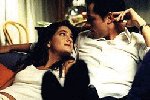 Shadows: Arthouse Films 03
Shadows: Arthouse Films 03
GUN-SHY | HIS BROTHER | THE LAST KISS
< < M O R E | M O R E > >
More mainstream art films have their own pages.
Even more offbeat films are at the SHADOWS FILM FESTIVAL.
last update
7.Jan.04
 AMANDLA! A Revolution in Four Part Harmony
AMANDLA! A Revolution in Four Part Harmony

|
dir Lee Hirsch with Miriam Makeba, Hugh Masekela, Abdullah Ibrahim, Vusi Mahlasela, Sibongile Khumalo, Thandi Modise, Dolly Rathebe, Sifiso Ntuli, Lindiwe Zulu, Peter Dimba, Sibusiso Nxumalo, Nelson Mandela release US 19.Feb.03; UK 19.Dec.03 02/South Africa 1h48  REVIEW BY RICH CLINE |
This is an expertly assembled film, catching us by the throat early on with the deeply resonant songs and anecdotes, and then tweaking our minds as well with a detailed look at Apartheid from an inside perspective. While the archival footage is colourful and revealing, including a number of old government films and docs, Hirsch shoots his new material with gorgeously bleached-yet-lush cinematography that adds an artistic tone to the film. He also constantly disarms the political arguments by focussing on the emotional reactions of the various people involved (including a chilling sequence with a group of white ex-cops reminiscing about trying to contain the protesting mobs). Hirsch also makes sure he presents the whole story, talking with terrorists and protestors both black and white. As we trace the years, the film centres on haunting songs of frustration, protest, solidarity, lamentation and begging for understanding from God as to why an entire people group has been forgotten. Not only is this a moving account of musical expression, but it's also a lucid and intensely valuable examination of the chronology of events ... and how a nation survived through desperation, willpower and strong-mindedness. Power to the people indeed. [12 themes, language, violence] 13.Nov.03
 CAPTURING THE FRIEDMANS
CAPTURING THE FRIEDMANS

|
dir Andrew Jarecki with David Friedman, Jesse Friedman, Arnold Friedman, Elaine Friedman, Seth Friedman, Howard Friedman, John McDermott, Frances Galasso, Abbey Boklan, Debbie Nathan, Peter Panaro, Jack Fallin release US 30.May.03; UK 9.Apr.04 03/US 1h47  REVIEW BY RICH CLINE |

The Friedmans were prominent members of their Long Island community, Mom and Dad and three sons living the American Dream. Then Dad (Arnold) was arrested for possession of child pornography, and investigators found evidence of widespread sexual abuse of students both by Arnold and one of his sons. Throughout the gruelling case, the Friedmans continue to film their family meetings--now shouting matches. This gives us a fascinating glimpse into their life, and muddles the simplistic story the media was trumpeting to the nation.
This is a gripping and often macabre film that's impossible to look away from even as it makes us feels like voyeurs watching the destruction of a happy family. It's also astonishing how Jarecki never takes sides, showing us what happens from every angle and letting us draw our own conclusions. The only thing that becomes clear is that most of the people outside the family (cops, lawyers, journalists, relatives) are deeply mistaken about what happened, if anything did. The film is full of bracingly honest self-examination, raw humour and a fascinating vein of hysteria and emotion, but its real power is in the intimate examination of family ties. Through Jarecki's careful filmmaking, each of the Friedmans becomes a compelling, involving character who we watch over the course of some 40 years. The revealing interviews, quirky details and wrap-up epilogue are not only strongly moving, but they leave us wanting to know even more about them all. [15 strong adult themes, language] 3.Jan.04
 GUN-SHY [Schussangst]
GUN-SHY [Schussangst]

|
dir Dito Tsintsadze; scr Dirk Kurbjuweit with Fabian Hinrichs, Lavinia Wilson, Johan Leysen, Lena Stolze, Christoph Waltz, Ingeborg Westphal, Rudolf-W Marnitz release UK 28.Nov.03 03/Germany 1h45  REVIEW BY RICH CLINE |
The film's script and direction slip in the knifepoint and twist it very slowly, making us squirm in our seats as Lukas starts opening his mind to scary new thoughts. And even though we know where the film is headed, the constant parade of wacky side characters throw off the track continually, lulled into a sense of security. Everything is done steadily, from the gliding camera work to the fluid editing style and low-key but natural performances. The film seems almost random, the characters feel slightly hapless ... and then we start to drift into hints of surrealism and a growing concentration on voyeurism. And yet even with the increasingly disturbing atmosphere, the film manages to make touching comments on society's treatment of marginal people--aimless loners like Lukas as well as abandoned retirees desperate to maintain their dignity. There's also a heavy dose of irony in the way the story works itself out. And while it's clever and rather creepy, the final conclusion isn't terribly surprising. [15 themes, language, nudity, sex] 21.Nov.03
 HIS BROTHER [Son Frθre]
HIS BROTHER [Son Frθre]

|
dir Patrice Chereau; scr Patrice Chereau, Anne-Louise Trividic with Bruno Todeschini, Eric Caravaca, Sylvain Jacques, Nathalie Boutefeu, Maurice Garrel, Antoinette Moya, Fred Ulysse, Catherine Ferran, Robinson Stevenin, Thierry Colas, Claudine Benichou, Veronique Iafrate release France 10.Sep.03; UK 20.Feb.04 03/France 1h35  REVIEW BY RICH CLINE |
This is filmed in an up-close, almost Dogme style with natural lighting and handheld camera work. We really get into the minds of these two men, and it's rarely through the dialog. The actors bring a startling physicality to their roles--the skin speaks volumes here. And the hospital settings bring out this theme as well; scenes of the day-to-day medical routine add to the film's overall body-conscience. Chereau fills the screen with tiny details about the characters and situations, telling things that let us into their minds and give us glimpses into the people around them. It's extremely well-shot and cleverly edited out of sequence (with titles that help us keep track). And as the characters begin to contemplate mortality we're surprised to find ourselves right there with them! As a telling examination of the awkwardness of brotherly bonds, this is a fascinating little film. It's sometimes a bit theatrical (the two-man story feels like it must have been adapted from a play, but it actually comes from a novel), and it's sometimes maddeningly elusive. But it's so intimate that it actually has the power to make you look at your own siblings in a new way. [15 themes, language, nudity] 10.Dec.03
 THE LAST KISS [L'Ultimo Bacio] [US title: One Last Kiss]
THE LAST KISS [L'Ultimo Bacio] [US title: One Last Kiss]

|
dir-scr Gabriele Muccino with Stefano Accorsi, Giovanna Mezzogiorno, Stefania Sandrelli, Giorgio Pasotti, Claudio Santamaria, Marco Cocci, Martina Stella, Sabrina Impacciatore, Daniela Piazza, Luigi Diberti, Pierfrancesco Favino, Regina Orioli release Italy 2.Feb.01; US 16.Aug.02; UK 27.Feb.04 01/Italy 1h55  remade as THE LAST KISS (2006) REVIEW BY RICH CLINE |
The underlying message of this film is bracing and powerful, looking at the compromises and realities of relationships in a fresh and honest way. Writer-director Muccino keeps things very energetic, with fluid and complicated camera work capturing people who are bursting with personality. We feel for all of these people, although none of them is terribly sympathetic, mostly because we can't admit that we see ourselves up on the screen ... but we do! Each person's inner turmoil is vividly portrayed in the solid performances, clever direction and a script that keeps its breezy tone even while tackling serious subjects. Carlo's dilemma is clearly the film's central focus, and it's pretty gripping stuff, nicely played by the charming Accorsi. But the film as a whole is a bit too spread out among all the side stories. Each one is quite compelling, which pulls us in too many directions. And for non-Italian-speakers, the film is fairly hard going, as the characters talk incessantly; it's sparky dialog but reading all those subtitles barely lets us look at their faces! Still, there are so many wonderful scenes in this film that it's impossible to dislike ... or ignore. [15 themes, language, sex] 4.Dec.03